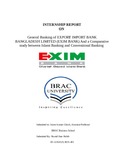| dc.contributor.advisor | Ghosh, Suntu Kumar | |
| dc.contributor.author | Habib, Hamid Ibne | |
| dc.date.accessioned | 2018-01-08T09:50:16Z | |
| dc.date.available | 2018-01-08T09:50:16Z | |
| dc.date.copyright | 2017 | |
| dc.date.issued | 2017-12-08 | |
| dc.identifier.other | ID 12104125 | |
| dc.identifier.uri | http://hdl.handle.net/10361/8978 | |
| dc.description | This internship report is submitted in a partial fulfillment of the requirements for the degree of Bachelor of Business Administration, 2017. | en_US |
| dc.description | Cataloged from PDF version of internship report. | |
| dc.description | Includes bibliographical references (page 56). | |
| dc.description.abstract | The banking sector of the country was started after the establishment of the Bangladesh Bank
and nationalization of six commercial banks which led the foundation of commercial banking in
public sector. Gradually conventional banks spread all over Bangladesh. Though Bangladesh is
overwhelmingly populated by Muslims, the idea of Shariah Based banking system developed
quite recently. The banking sector of the country is dominated by conventional/commercial
banks and there are only a few (eight) Islami Banks. This certain study looks forward about the
mode by which an Islami Bank (EXIM Bank Bangladesh ltd) operates and what are the main
differences between Islami Banks and conventional banks. The word Shariah attracts to the
religious minded people of the country. Due to rising popularity of Islami banks some
conventional banks are also trying to offer some Shariah based services (Ullah & Azad
Chowdhury, 2013). Eight Islami Banks of the country share 18% of the total assets of the
banking sector which is very high compared to rest 82% of the total assets shared among the
conventional banks. This internship report was started with an humble attempt to illustrate the
nature and character of Islamic Banking vis-à-vis the conventional banking. But at the end the
outcome has proved to be by far a short raw and shallow description – an attempt with many
short fall, incompetency’s, and ignorance’s – vast areas remaining unknown and unexplored due
to time constraint.
Key words: Islami banks, Conventional banks, Mudaraba, Mudarib. | en_US |
| dc.description.statementofresponsibility | Hamid Ibne Habib | |
| dc.format.extent | 63 pages | |
| dc.language.iso | en | en_US |
| dc.publisher | BARC University | en_US |
| dc.rights | BRAC University Internship reports are protected by copyright. They may be viewed from this source for any purpose, but reproduction or distribution in any format is prohibited without written permission. | |
| dc.subject | General banking | en_US |
| dc.subject | Islami banking | en_US |
| dc.subject | Conventional banking | en_US |
| dc.subject | EXIM Bank Limited | en_US |
| dc.title | General banking of EXIM Bank and a comparative study between islami banking and conventional banking | en_US |
| dc.type | Internship report | en_US |
| dc.contributor.department | BRAC Business School, BRAC University | |
| dc.description.degree | B. Business Administration | |

